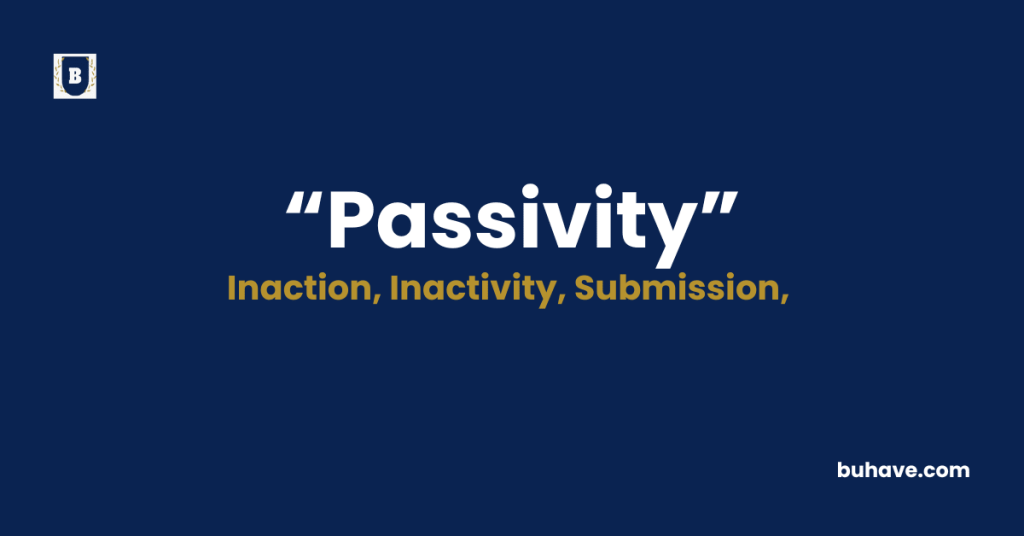The word Passivity (Noun) refers to the quality of being inactive, unresponsive, or not reacting to situations or influences. In this guide, you’ll learn the full definition, synonyms, antonyms, etymology, and real-life examples of how to use Passivity correctly in sentences.
Passivity Explained in Depth
A complete and detailed guide to the word Passivity including meaning, definition, examples, etymology, synonyms, and antonyms.
Meanings of Passivity
Passivity means a state of inaction, detachment, or acceptance without resistance. It often describes someone who allows events to unfold without effort, objection, or participation, even in situations where involvement is possible or expected.
Definition
Passivity refers to the condition or behavior of not taking initiative, avoiding confrontation, and yielding control or decision-making to others. It may arise from fear, indifference, low confidence, or learned behavior. In personal relationships, a passive individual might avoid expressing opinions or needs. In larger contexts like politics or social movements, passivity can signify a lack of engagement or willingness to act. While it may sometimes reflect peace-seeking or patience, it can also lead to stagnation or exploitation if prolonged. Passivity isn’t always negative—it depends on the situation.
However, it often suggests a lack of agency or assertiveness that may prevent growth, change, or resolution. The term is used in psychology, social dynamics, and communication to describe behavior that contrasts with action, assertiveness, or resistance.
Etymology
The word “passivity” comes from the Latin root passivus, meaning “capable of feeling or suffering.” This derives from patior, meaning “to suffer” or “to endure.” In the 14th century, Middle English adopted “passive” from Old French passif. The noun “passivity” emerged later, around the 17th century. Originally linked to the idea of receiving rather than doing, it was used in grammar to describe passive voice constructions. Over time, its use expanded to describe personal behavior and social tendencies.
Philosophers and psychologists began using “passivity” to explore human will, motivation, and submission. Today, it maintains a range of meanings, from linguistic structure to emotional inaction, reflecting a rich history of evolving interpretations and uses.
Example Sentences
- His passivity in meetings made it difficult to understand his opinions.
- Passivity in the face of injustice often leads to prolonged suffering.
- She mistook his calm for passivity, unaware of his quiet strength.
Passivity Synonyms
- Inactivity
- Submissiveness
- Detachment
- Indifference
- Inertia
- Apathy
- Unresponsiveness
- Quietness
- Yielding
- Resignation
Passivity Antonyms
- Assertiveness
- Action
- Initiative
- Engagement
- Responsiveness
- Participation
- Involvement
- Proactivity
- Resistance
- Leadership
FAQs about Passivity
Here are some frequently asked questions (FAQs) about the word “Passivity”
1. What does passivity mean in psychology?
It refers to behavior marked by avoidance, submission, or lack of response to external stimuli or social interactions.
2. Is passivity always harmful?
No. Sometimes it reflects patience or tolerance, though it may become problematic if it prevents necessary action.
3. What causes passivity?
It may result from fear, trauma, cultural norms, low self-esteem, or learned helplessness.
4. How is passivity different from calmness?
Calmness involves control and awareness, while passivity implies detachment or unwillingness to act.
5. Can passivity be changed?
Yes. Through self-awareness, assertiveness training, and supportive environments, passive habits can shift over time.

















